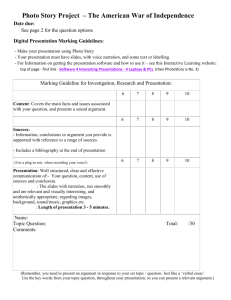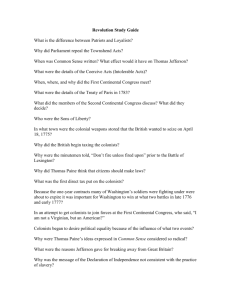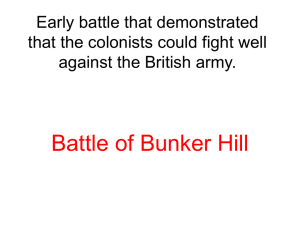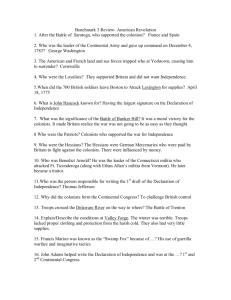Chapter 5: THE AMERICAN REVOLUTION Chapter 5 DQ #3
advertisement
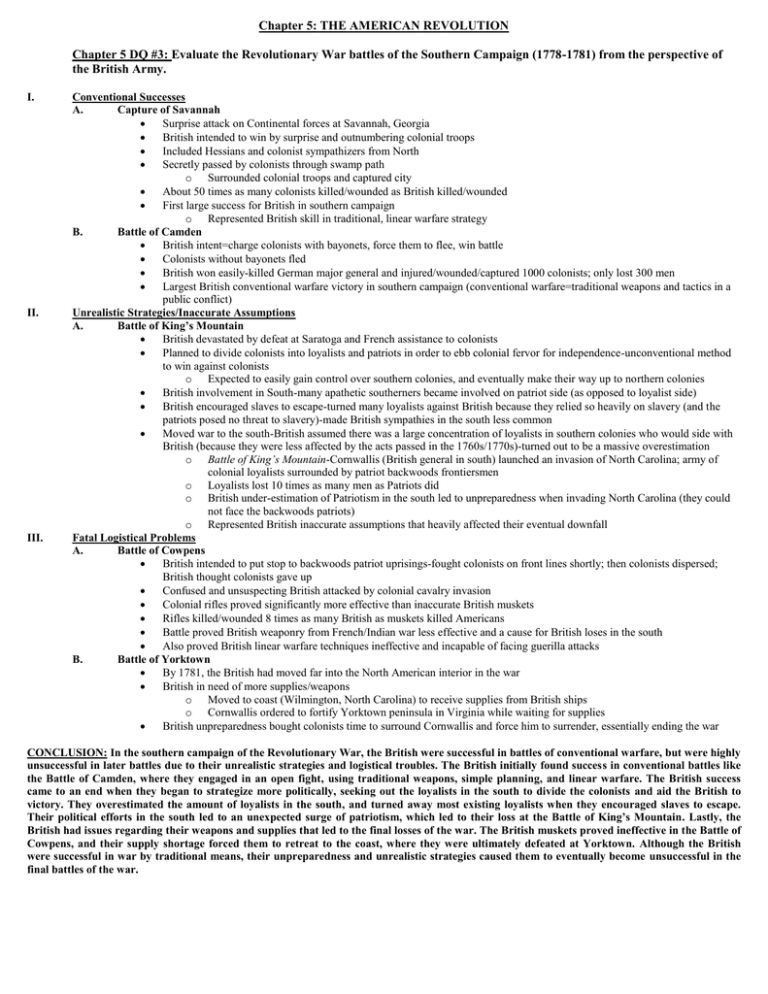
Chapter 5: THE AMERICAN REVOLUTION Chapter 5 DQ #3: Evaluate the Revolutionary War battles of the Southern Campaign (1778-1781) from the perspective of the British Army. I. II. III. Conventional Successes A. Capture of Savannah Surprise attack on Continental forces at Savannah, Georgia British intended to win by surprise and outnumbering colonial troops Included Hessians and colonist sympathizers from North Secretly passed by colonists through swamp path o Surrounded colonial troops and captured city About 50 times as many colonists killed/wounded as British killed/wounded First large success for British in southern campaign o Represented British skill in traditional, linear warfare strategy B. Battle of Camden British intent=charge colonists with bayonets, force them to flee, win battle Colonists without bayonets fled British won easily-killed German major general and injured/wounded/captured 1000 colonists; only lost 300 men Largest British conventional warfare victory in southern campaign (conventional warfare=traditional weapons and tactics in a public conflict) Unrealistic Strategies/Inaccurate Assumptions A. Battle of King’s Mountain British devastated by defeat at Saratoga and French assistance to colonists Planned to divide colonists into loyalists and patriots in order to ebb colonial fervor for independence-unconventional method to win against colonists o Expected to easily gain control over southern colonies, and eventually make their way up to northern colonies British involvement in South-many apathetic southerners became involved on patriot side (as opposed to loyalist side) British encouraged slaves to escape-turned many loyalists against British because they relied so heavily on slavery (and the patriots posed no threat to slavery)-made British sympathies in the south less common Moved war to the south-British assumed there was a large concentration of loyalists in southern colonies who would side with British (because they were less affected by the acts passed in the 1760s/1770s)-turned out to be a massive overestimation o Battle of King’s Mountain-Cornwallis (British general in south) launched an invasion of North Carolina; army of colonial loyalists surrounded by patriot backwoods frontiersmen o Loyalists lost 10 times as many men as Patriots did o British under-estimation of Patriotism in the south led to unpreparedness when invading North Carolina (they could not face the backwoods patriots) o Represented British inaccurate assumptions that heavily affected their eventual downfall Fatal Logistical Problems A. Battle of Cowpens British intended to put stop to backwoods patriot uprisings-fought colonists on front lines shortly; then colonists dispersed; British thought colonists gave up Confused and unsuspecting British attacked by colonial cavalry invasion Colonial rifles proved significantly more effective than inaccurate British muskets Rifles killed/wounded 8 times as many British as muskets killed Americans Battle proved British weaponry from French/Indian war less effective and a cause for British loses in the south Also proved British linear warfare techniques ineffective and incapable of facing guerilla attacks B. Battle of Yorktown By 1781, the British had moved far into the North American interior in the war British in need of more supplies/weapons o Moved to coast (Wilmington, North Carolina) to receive supplies from British ships o Cornwallis ordered to fortify Yorktown peninsula in Virginia while waiting for supplies British unpreparedness bought colonists time to surround Cornwallis and force him to surrender, essentially ending the war CONCLUSION: In the southern campaign of the Revolutionary War, the British were successful in battles of conventional warfare, but were highly unsuccessful in later battles due to their unrealistic strategies and logistical troubles. The British initially found success in conventional battles like the Battle of Camden, where they engaged in an open fight, using traditional weapons, simple planning, and linear warfare. The British success came to an end when they began to strategize more politically, seeking out the loyalists in the south to divide the colonists and aid the British to victory. They overestimated the amount of loyalists in the south, and turned away most existing loyalists when they encouraged slaves to escape. Their political efforts in the south led to an unexpected surge of patriotism, which led to their loss at the Battle of King’s Mountain. Lastly, the British had issues regarding their weapons and supplies that led to the final losses of the war. The British muskets proved ineffective in the Battle of Cowpens, and their supply shortage forced them to retreat to the coast, where they were ultimately defeated at Yorktown. Although the British were successful in war by traditional means, their unpreparedness and unrealistic strategies caused them to eventually become unsuccessful in the final battles of the war. Battle of King’s Mountain Battle of Camden Battle of Yorktown Works Cited http://www.history.com/topics/battle-of-cowpens http://www.loc.gov/teachers/classroommaterials/presentationsandactivities/presentations/timeline/amrev/south/ http://www.history.com/this-day-in-history/battle-of-kings-mountain http://www.history.com/topics/battle-of-camden http://www.history.com/this-day-in-history/british-capture-savannah-georgia

